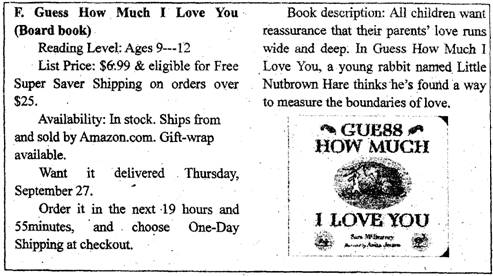题目内容
Susan wanted to be independent of her parents. She tried ________ alone, but she didn't like it and moved back home.
- A.living
- B.to live
- C.to be living
- D.having lived
解析:
解析:考查非谓语动词。此处表示“她尝试着单独居住,但不喜欢又搬回去住了”,try doing表示“尝试着做”,故用现在分词。

The Best of Friends
The evidence for harmony may not be obvious in some families. But it seems that four out of five young people now get on with their parents, which is the opposite of the popularly held image (印象) of unhappy teenagers locked in their room after endless family quarrels.
evidence for harmony may not be obvious in some families. But it seems that four out of five young people now get on with their parents, which is the opposite of the popularly held image (印象) of unhappy teenagers locked in their room after endless family quarrels.
An important new study into teenage attitudes surprisingly shows that their family life is more harmonious than it has ever been in the past. “We were surprised by just how positive today’s young people seem to be about their families,” said one member of the research team. “They’re expected to be rebellious (叛逆的) and selfish but actually they have other things on their minds; they want a car and material goods, and they worry about whether school is serving them well. There’s more negotiation (商议) and discussion between parents and children, and children expect to take part in the family decision-making process. They don’t want to rock the boat.”
So it seems that this generation of parents is much more likely than parents of 30 years ago to treat their children as friends. “My parents are happy to discuss things with me and willing to listen to me,” says 17-years-old Daniel Lazall. “I always tell them when I’m going out clubbing. As long as they know what I’m doing, they’re fine with it.” Susan Crome, who is now 21, agrees. “Looking back on the last 10 years, there was a lot of what you could call negotiation. For example, as long as I’d done all my homework, I could go out on a Saturday night. But I think my grandparents were a lot stricter with my parents than that.”
Maybe this positive view of family life should not be unexpected. It is possible that the idea of teenage rebellion is not rooted in real facts. A researcher comments, “Our surprise that teenagers say they get along well with their parents comes because of a brief period in our social history when teenagers were regarded as different beings. But that idea of rebelling and breaking away from their parents really only happened during that one time in the 1960s when everyone rebelled. The normal situation throughout history has been a smooth change from helping out with the family business to taking it over.”
【小题1】 What is the popular image of teenagers today?
| A.They worry about school. | B.They quarrel a lot with other family members |
| C.They have to be locked in to avoid troubles. . | D.They dislike living with their parents. |
| A.share family responsibility | B.make family decisions |
| C.go boating with their family | D.cause trouble in their families |
| A.go to clubs more often with their children | B.give their children more freedom |
| C.care less about their children’s life | D.are much stricter with their children |
| A.existed only in the 1960s | B.is common nowadays |
C.may be a f alse belief alse belief | D.resulted from changes in families |
| A.Harmony in family. | B.Education in family. |
| C.Negotiation in family. | D.Teenage trouble in family. |





